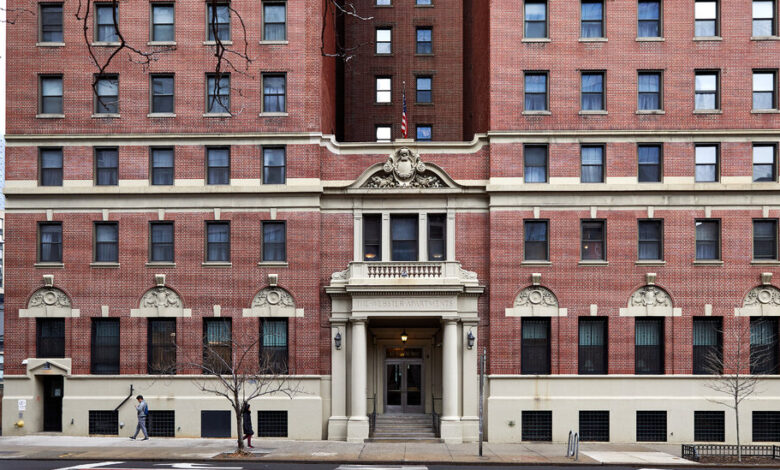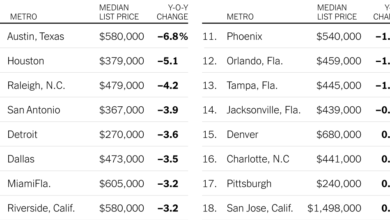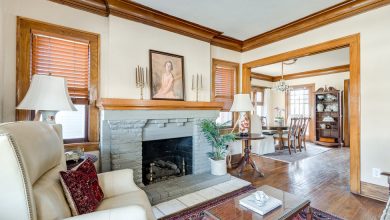The Rehearsal Club, Housing For Aspiring Artists, Returns to N.Y.C.

[ad_1]
Those attempting to rent an apartment in New York City complain about the indignity of it all — the long days they spend in fruitless searches; the raft of financial documents they must provide; the very large checks they have to write for very small spaces; the broker fees.
Perhaps a bit of perspective is in order. Would-be residents of a particular wing on the 12th floor of the Webster Apartments, a building on West 34th Street, must first give ‘em the old razzle-dazzle — a song, a dance, perhaps a monologue. They have to audition for the privilege of a roof over their heads.
Welcome to the Rehearsal Club, an artist residency and the one-year-old reincarnation of a nonprofit organization founded in 1913 by Jane Harriss Hall, an Episcopal deaconess, and Jean Greer, the daughter of New York’s Episcopal bishop. Their ambition was to provide an affordable safe haven in the big city for young women embarking on a career in the performing arts.
In 1926, the club took over a pair of brownstones on West 53rd Street, thanks to the beneficence of John D. Rockefeller Jr. Through the years, through the doors went, among others, Jayne and Audrey Meadows, Shirley Booth, Carol Burnett, Blythe Danner, Diane Keaton, Sandy Duncan, Kim Cattrall and Cynthia Darlow, best known for her recurring role as Joel Maisel’s secretary Mrs. Moskowitz on “The Marvelous Mrs. Maisel.”
Their ranks also included Margaret Sullavan, who later starred in the 1936 Broadway hit “Stage Door,” a play inspired by the Rehearsal Club. (Katharine Hepburn, Ginger Rogers and Lucille Ball were part of the cast of the 1937 film adaptation.)
“Most girls would move in for two or three years,” said Gale Patron, 77, who was a resident in the mid-1960s when she was a drama student. Now, as the club’s president, she’s spearheading its revival.
“Here we were, all these young hopefuls,” continued Ms. Patron. “We would trade dresses for particular auditions. We were so supportive of one another because we were all fighting the same fight. We became a family.”
‘Saved My Life’
No auditions were required in those days though applicants did have to demonstrate a seriousness of purpose and furnish letters of reference.
A game attitude was helpful if not explicitly required. Depending on the head count — the club hit capacity at 40 residents give or take — new arrivals might well end up on a cot in the hall, or as was the case of Ms. Burnett, on a cot in what was known as the transit room. But the modest rent, which included two meals a day, and the esprit de corps counted for a lot.
“The Rehearsal Club saved my life,” said Ms. Burnett, 89, who moved to New York from California in August of 1954 after finishing college. “I had no idea where I was going to stay. I was so naïve. A girl who had graduated from U.C.L.A. ahead of me gave me her number and told me to get in touch with her if I ever got to the city.
“As soon as I landed, I went to the Algonquin Hotel. It was $9 a night, and I had very little money,” Ms. Burnett continued. “I phoned my friend who asked where I was. When I told her, she said, ‘What are you doing in a hotel? Get over here right now.’ So I got my cardboard suitcase and trudged up Sixth Avenue to the Rehearsal Club where it was $18 a week for room and board.”
Quite a bargain even though Ms. Burnett had four roommates. “There was Joyce, who’d been around the block a few times. She was kind of hardened,” she recalled. “And then there was the Stanislavski actress who never bathed, and an English girl who was bright and cute and funny and was into Spanish dancing.” Rounding out the group was Yvonne Craig, a ballerina who played Bat Girl in the 1960s series “Batman.”
“There were always hose and underwear hanging from the shower rack,” Ms. Burnett said. “But it was wonderful. I made friends. I learned the ropes about how to go out and pound the pavement and get an agent.”
Ms. Danner recalls “a wonderful hubbub, the happy noise of girls doing their scales. We had some Rockettes from Radio City Music Hall who would be dancing around, actors would be reading scenes. It was just a center of unusual artist endeavors under one roof.”
The Rehearsal Club carried on for 66 years, shuttering in 1979 after losing its tax-exempt status. The two brownstones were later razed.
The Revival
In 2005, Kathleen Conry, a singer and dancer whose credits include Broadway shows and national tours, was asked to direct a summer stock production of “Stage Door” in New Hampshire.
Ms. Conry, now 75, could have certainly drawn on her own experience when staging the show. She moved to New York from Cleveland right out of high school in the fall of 1966 to pursue a performing career and settled into a double room on the fourth floor of the Rehearsal Club.
“But I felt I needed more fodder,” said Ms. Conry, who put the word out through Actors Equity, the theater union, that she was looking to meet with other Rehearsal Club alums.
A dozen heeded the call and convened at Ms. Conry’s apartment to talk about old times. “It was so much fun we said we had to keep meeting — and we did,” she said. One thing led to another, including a centennial celebration for the organization in 2013 and a 105th anniversary gala at the Players, a private club in Gramercy founded for actors.
“I had no idea where any of this would go,” Ms. Conry said. “The goal was simply to reconnect, but we all thought it would be great to have another Rehearsal Club residence.”
Fortune was on their side. When Ms. Darlow of “The Marvelous Mrs. Maisel,” mentioned her time at the Rehearsal Club in a New York Post profile in 2018, “I hit a nerve when I talked about the need for finding a safe place for young women to live,” she recalled.
The executive director of the Webster Apartments, which rents single rooms to women who are studying, interning or starting a career in the city, saw the article and invited Ms. Darlow to come by for a tour of the facilities.
“We talked to her about the Rehearsal Club’s ambitions and the ways that we could work together to serve women in New York City,” said Tara Scott, the director of guest services and marketing at the Webster Apartments. “And we told them that if and when they got to a point that they wanted to provide housing as they had done in the past to reach out to us.”
Almost three years ago, Ms. Patron began a fund-raising campaign with that precise goal in mind. The campaign raised $225,000 in pledges. “At first we thought we could pay for one room, then we thought five and then we were able to do 10,” she said.
With the demand for affordable housing great and the list of deserving hopefuls long, the Rehearsal Club board decided to institute auditions to winnow the pool. The chosen pay $1,000 a month, a fee that includes two meals per day, utilities, Wi-Fi, 24-hour security, free use of a washing machine and dryer, workshops, master classes, a mentorship program and a dedicated rehearsal space with a piano. The Rehearsal Club picks up the remainder of the $1,700 per month rent.
“This is an investment on our parts and we’re offering a lot,” said Andrea Frierson, an actor and playwright who lived at the Rehearsal Club for two years in the early 1970s before appearing in Broadway productions of “Eubie,” “Once on This Island” and “The Lion King.” She is now the head of the club’s audition panel, which evaluates the videos and then conducts Zoom interviews with candidates whose performances pass muster. Budding scenic and lighting designers and playwrights are also welcome to apply; for the moment, they’re outnumbered by actors, singers and dancers.
“We’re always looking for talent and it’s very exciting when you see it,” added Ms. Frierson who estimates that she and her colleagues have looked at 50 videos over the course of the last year.
Some who were deemed not completely up to snuff in the talent department, “were very focused and ambitious and enthusiastic,” Ms. Frierson said. “And it was thought that they could grow into something in time.” Admittedly, there were a few who “need to have more going for them” to make the cut, she said.
‘Stars in My Eyes’
Shawnee Fierros Casas Richberger sang “My Brother Lived in San Francisco” on her audition tape and subsequently became a member of the Rehearsal Club’s inaugural class at the Webster Apartments (the building is in the process of being sold and the Rehearsal Club plans to set up shop later this year in Webster’s new, as yet unspecified location).
“My family was concerned about my moving to the city from my small farm town,” said Ms. Richberger, 23, who grew up in Gilbert, Ariz. “They felt that this was the best-case scenario. The price, she added, “was fantastic. It added to the stars in my eyes. It meant that I wouldn’t have to work so many hours and that I’d still have time to audition.”
Granted the reanimated Rehearsal Club — and the Webster itself — are a bit of a throwback. All-female residences in New York City are all but extinct. The vaunted Barbizon Hotel for women began admitting men in 1981 and was later converted first to a hotel, then, in 2007, to a condominium. The Evangeline in the West Village, the East End Hotel on the Upper East Side and the Y.W.C.A.’s Studio Club all closed in the 1970s. The Katharine House and the Roberts House, both owned by the Ladies Christian Union, shut their doors in 2000.
A few weeks ago, Abiageal Mangum, just back from a visit to her family in North Carolina, greeted a friend as she pulled a small rolling trunk into her dorm-style room at the Webster Apartments.
A few minutes later, Ms. Mangum, a student at Circle in the Square Theater School, began vocalizing; her voice filled a narrow corridor lined with gray painted doors, each with a plaque that read “The Rehearsal Club.” Some of those plaques included a name, a small tribute to donors like Ms. Burnett and Ms. Danner, who each contributed $20,000 to the club’s residency program.
For Zoe Smith, 20, a student at Circle in the Square Theater School, “the plaques are a constant reminder that this is something bigger than regular housing.”
“It’s really nice to walk down the hall and hear the girls doing their vocal exercises or maybe they’re rehearsing a song for an audition,” said Maria Elena de la Noval, the residency program coordinator — think house mother — and keeper of the room roster.
When, for example, Kelsey Lepesko, 23, got a 10-month contract as dancer and singer on a Royal Caribbean cruise ship soon after she moved into Room 1222, it created an opportunity for someone on the waiting list. So far, 16 women have lived on the Rehearsal Club wing for periods ranging from a few months to a year.
Ms. Lepesko returned to the Rehearsal Club at the end of January. “I love being here so much,” she said. “I love being around all these motivated people.
“And,” she added, “I could not afford to live in this part of the city without this program.”
Ms. de la Noval, who also has a room on the wing, spoke with admiration of the way her young charges have met the challenges of life in New York City.
“I thought I would have a lot more to do as far as overseeing them because you have that motherly thing. But they’re building their own community. They get together and do activities and help each other out.”
Ms. Richberger said that she has had several callbacks for roles in Broadway and Off Broadway shows and that she recently came very close to being cast as a lead character in a television series.
“I’m thinking I’ll be here for another year, maybe six months,” she said. “The ultimate goal is to leave the Rehearsal Club and get an apartment. But I want to get a really good gig before I go.”
[ad_2]
Source link






